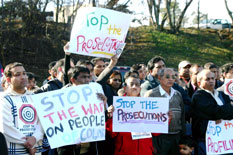DEA frames Georgia’s South Asians
By
Dianne Mathiowetz
Decatur, Ga.
Published Jan 12, 2006 8:47 AM
Several hundred
protesters, mostly South Asian, rallied here Jan. 8 in a mall parking lot to
denounce selective prosecution and racial profiling by federal
authorities.
|
South Asians protest racist DEA repression.
WW photo: Alka Roy
|
In June 2005, the Drug Enforcement Agency (DEA) launched
Operation Meth Merchant in several counties in north Georgia. The Agency used
informants convicted of producing and selling methamphetamine (meth) to make
purchases at convenience stores of the common, legal items used to make the
drug. These ingredients include cold medications, matches, charcoal and
anti-freeze. The white, English-speaking informants were promised reductions in
their prison sentences if they assisted with the successful prosecution of store
clerks and owners who sold them these items.
Although the number of
convenience stores owned by South Asians in the north Georgia mountains is
relatively small, it is these stores, not the large-scale, chain drug stores,
grocery stores or Wal-Marts that were targeted.
Forty-four of the 49
people arrested in Operation Meth Merchant are South Asian, many with the last
name Patel. Most of the cases rest on the testimony of a single
informant.
Present at the rally were several Indian men and women who have
been arrested and jailed for days on the basis of this informant’s
accusations.
McCracken Posten, a Ringgold, Ga., lawyer, described the
cases of Shirak and Malvika Patel. The informant identified them as selling him
cold medicine on specific days at a certain convenience store. However, Shirak
was in India at the time on a month-long visit to family. Malvika is not the
store clerk heard on the tape telling the undercover buyer that she can’t
sell him the number of bottles of cold medicine he asks for. At the exact time
the informant claims Malvika Patel knowingly sold him cold medications for meth
production, she was an hour away picking up her child from daycare. She has
never even been in the store where the sale took place.
Yet despite the
glaring inaccuracies of the informant’s identification of them, it took
months for the charges against Shirak and Malvika Patel to be dropped. In the
meantime, their personal and business reputations were harmed, legal expenses
mounted and their children and family suffered.
A key element of the
government’s evidence against the many immigrant clerks is that the
undercover buyer used drug-related slang when making the purchases of these
everyday products. Attorney Posten remarked that most people would not recognize
these terms, much less people whose English was not fluent.
A few of the
arrested clerks—when threatened with up to 25 years in federal prison,
forfeiture of family stores and fines up to $250,000—pled guilty to lesser
charges. They now face deportation to India.
Trials for some of the others
begin Jan. 10 in Rome, Ga. Rally participants were urged to pack the courtroom
to show support for the defendants.
Several speakers at the protest
explained how the so-called “war on drugs” started by President
Richard Nixon in 1971 has been a war on communities of color. Billions of
dollars have been spent enforcing increasingly harsh drug laws, resulting in
huge increases in the prison population. Of the estimated 14 million people in
the U.S. who are drug users, the vast majority—approximately 10
million—are white. The overwhelming percentage of those convicted of drug
offenses, however, are African-American and Latino. Money for rehabilitation and
treatment programs and preventative education is routinely cut while repressive,
often racist police tactics expand.
Deepali Gokhale, coordinator for the
Racial Justice Campaign Against “Operation Meth Merchant” which
organized the rally, pointed out that this type of racial profiling and
selective prosecution is experienced by many others in U.S. society and she
urged unity among immigrants and with other marginalized populations.
With
fists in the air, the rally was punctuated with chants that translated to
“against every injustice and oppression, we will fight.”
Local
media covered the protest, and news papers throughout India reported on
it.
The Campaign asks that letters demanding that the selective
prosecutions be stopped be sent to David Nahmias, U.S. Attorney’s Office,
Northern District of Georgia, 75 Spring St. SW, Suite 600, Atlanta, Ga. 30303.
Articles copyright 1995-2012 Workers World.
Verbatim copying and distribution of this entire article is permitted in any medium without royalty provided this notice is preserved.
Workers World, 55 W. 17 St., NY, NY 10011
Email:
[email protected]
Subscribe
[email protected]
Support independent news
DONATE


